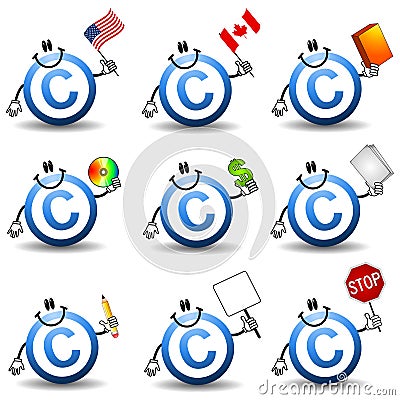My LLM
Saturday 20 November 2010
What is protected under copyright?
Under Copyright, Designs and Patents Act 1988 section 1(1)
"Copyright is a property right which subsists in accordance with this Part in the following descriptions of work—
(a)original literary, dramatic, musical or artistic works,
(b)sound recordings, films or broadcasts, and
(c)the typographical arrangement of published editions."
However, there is no copyright in an idea, only in way in which the idea is expressed.
For example, Ben take a photo of Alnwick Castle. Then Rob sees this photo, he think it is a nice photo. Rob goes to Alnwich Castle, he take a photo of Alnwick Castle in the same angle, adjustment. He sets his camera up just the same way Ben did. Nonetheless , this is not infringement of copyright because there is no copyright in an idea.
References
Designs and Patents Act 1988
Intellectual Property Law Lecture's slide
David I. Bainbridge, Intellectual Property (8th edn Pitman Publishing, London 2010)
Wednesday 17 November 2010
Is it illegal to jailbreak you iPhone?
What is Jailbreak?
In short, jailbreak is the process one goes through which allows the installation of unofficial third-party applications.
Is it illegal?
No, because you bought your iPhone so what you do with it is up to you. For example: break it, use it as paperweight, anything you want including jailbreak it. It is your belonging anyway.
US Government even set forth new rules, state that jailbreak and unlock their iPhone devices are not illegal.
References
http://www.iphonespies.com/iphone-news/is-it-illegal-to-jailbreak-your-iphone/
http://osxdaily.com/2010/07/26/is-jailbreaking-your-iphone-illegal-not-anymore/
Sunday 14 November 2010
Is "Parody of Work" infringement the copyright
In the case, Glyn v Weston Feature Film Company
Glyn was the authoress of a novel called ‘Three Weeks’. The story is about a young Englishman and a mysterious lady who meet each other in Lucerne and enjoy three weeks liaison.
The defendants made a film called ‘Pimple’s Three Weeks (without the Option)’, which is ‘frankly farcical and vulgar to an almost inconceivable degree’. The film was obviously based on the book.
However, Younger J held that there are numerous aspects of the film, which have no counterpart in the book and vice versa. Consequently, he held that there is no infringement of the plaintiff’s copyright in the novel.
Under this case, parody is not infringement the copyright. It entitled to special treatment, because a parodist usually ‘bestows’ much labour upon his new work.
Further reading
US case, Campbell v Acuff-Rose Music Inc
Parody for advertisement is infringement the copyright
Williamson Music Ltd v The Pearson Partnership Ltd
References
Itse Gerrits, Intellectual Property Law: Parody in Copyright Law
Glyn v Weston Feature Film Company
http://t0.gstatic.com/images?q=tbn:ANd9GcQBQ-TkCn7cjk-mZ1hadhfj7vNNn-EGlVKUllXVARtL-xfjbT0KcA
Friday 12 November 2010
Is it ok to use the word "Unlimited" for advertisement
Some internet providers use the word "unlimited" for internet downloads allowance, and some mobile providers use it for calls allowance. However, it usually comes with the small print in the bracket states that "fair use policy" or "??? MB limit" etc.
According to Advertising Standards Authority (ASA):
"It should be acceptable to describe an aspect of a service as 'unlimited' (e.g. 'for just £12 a month you can make unlimited calls to numbers beginning 01 and 02') despite the existence of a fair-use policy, which is invoked to prevent misuse of the service, providing the policy's existence is stated in the ad."
Generally, as long as you mention your "unlimited" service has an enforceable limitation, you're okay to advertise it as having no limit.
Interesting cases
Case of T-Mobile (ASA ruled in favour of T-Mobile)
http://www.asa.org.uk/Complaints-and-ASA-action/Adjudications/2008/9/T_Mobile-%28UK%29-Ltd/TF_ADJ_44966.aspx
Case of Orange's Moblie (ASA upheld the claims of T-Mobile)http://www.asa.org.uk/Complaints-and-ASA-action/Adjudications/2007/9/Orange-Personal-Communications-Services-Ltd/TF_ADJ_43242.aspx
References
http://www.asa.org.uk/
http://www.wired.co.uk/news/archive/2010-06/17/o2-was-right-to-ditch-unlimited-iphone-4-data-plans
http://www.pc-help-ipswich.co.uk/internet.gif
Wednesday 10 November 2010
Fair trade
Check out this SlideShare Presentation:
Present fair trade
View more presentations from Puvanai Thienpoempool.
Trademark
A trademark that eligible for registration has to have a distinctive character. There are 4 types of character including generic, descriptive, suggestive, and arbitrary. These 4 terms use to determine the character of trademark that can be register.
The first two categories, generic and descriptive have no distinctive character, but there are some type of descriptive character which it has established the distinctive character through extensive use in the marketplace (it acquires secondary meaning). This kind of character has distinctive character. The other two categories, suggestive and arbitrary have distinctive character. Only the mark with distinctive character can be register under the trademark law, and are protected.
Generic terms are common words or terms, often found in the dictionary, that identify products and services and are not specific to any particular source. Generic term is not possible to register as a trademark for the goods or services.
Example 1. You can't use the word "CHAIR" as a trademark for -------------------------------------->
References
International Trademark Association (INTA)
http://www.inta.org/index.php?option=com_content&task=view&id=1514
http://www.inta.org/index.php?option=com_content&task=view&id=1514
http://www.registeringatrademark.com/protectable-marketable-trademark.shtml
http://www.legaldocs101.com/trademark.jpg
Monday 8 November 2010
Duration of Copyright (Is it too long?)
The duration of copyright depend on the nature of the work in question for example:
1. Literary, dramatic, musical and artistic works = the life of the author plus 70 years.
2. Sound recording = at least 50 years.
3. Broadcasts = 50 years
4. Typographical arrangements of published editions = 25 years
In my opinion, the copyright is created to protect and promote the right of author. It is also a motivation for anyone to create a new work. Thus the copyright supposes to last for a long duration according to the hard work of author. Under 4 categories above, I think it is not too long.
References
David I. Bainbridge, Intellectual Property (8th edn Pitman Publishing, London 2010)
http://www.dreamstime.com/copyright-symbol-cartoons-thumb4750200.jpg
http://www.dreamstime.com/copyright-symbol-cartoons-thumb4750200.jpg
Subscribe to:
Posts (Atom)



